This content is being reviewed in light of recent changes to federal guidance.
The Making of the 9th Annual BLS; Black Writing in Reel Time
As HBW’s 9th annual Black Literary Suite is coming to an end, I find myself reflecting on HBW’s team and all the hard work that has gone into this event. In order to highlight our amazing staff members, and give you all a better idea of what all goes into BLS, I interviewed the team responsible for the 2020 Black Literary Suite.
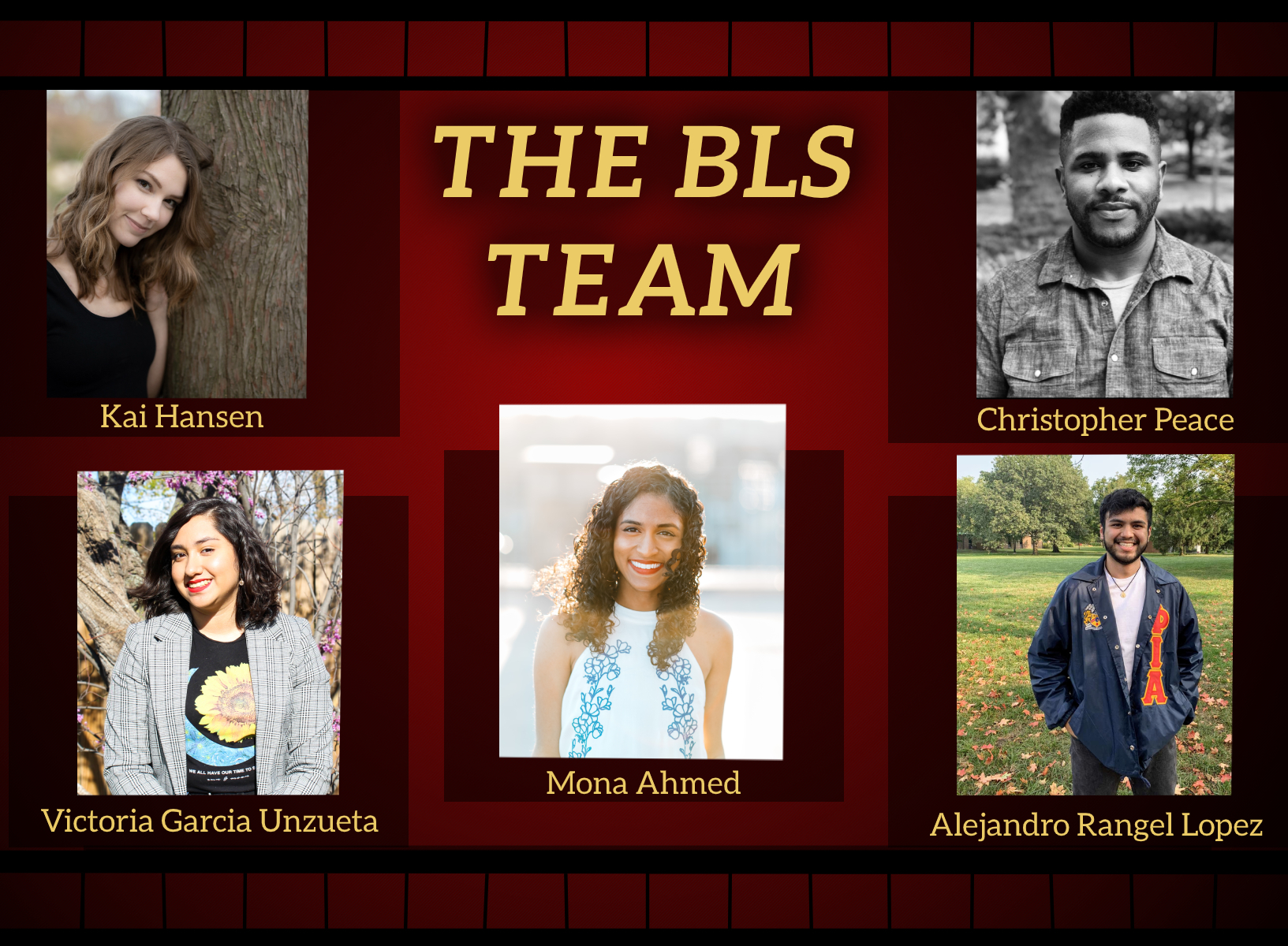
The following answers are from Victoria Garcia Unzueta, Alejandro Rangel-Lopez, Mona Ahmed, and Christopher Peace.
What was your role in the creation of BLS?
V: My primary role in the creation of BLS was conducting research and creating the write-ups for the films chosen. I researched both the novels and their corresponding films, as well as researched audience reaction and scholarly reviews of both pieces of work.
A: My role in this year’s BLS was researching and writing some of the write-ups for the novels and their accompanying films; everything from biographical information to box office information.
M: I created the interactive map and timeline in addition to researching my assigned books and films.
C: For this year’s BLS, I’ve worked with Kai with directing this public program and creating a podcast that explains the importance of this event. I’ve communicated closely with the panelists and moderator in preparation for November 11th’s panel. I’ve also edited some elements of the interactive map.
For those to whom it applies, which works did you research for the panels?
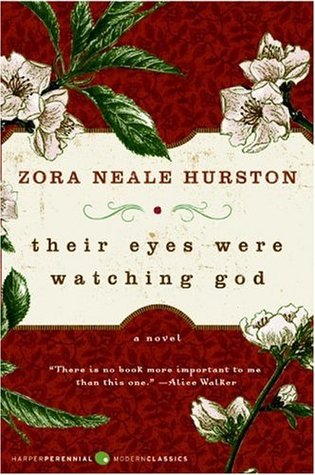
V: I researched The Hate U Give, 12 Years a Slave, Their Eyes Were Watching God, The Learning Tree, and Native Son.
A: I researched The Sport of the Gods, Foxes of Harrow, and The Landlord.
M: I researched The Homesteader, Go Tell it on the Mountain, Beloved, and Waiting to Exhale.
How did you decide what works should be included in the panels?
M: Vincent Omni, Hamza Rehman, and I went through BBIP’s [Black Book Interactive Project] excel sheet and highlighted books that were found in HBW’s novel collection. We then tried to pick a variety of books from different genres and time periods.
How did you decide what works should be included in the panels?
M: Vincent Omni, Hamza Rehman, and I went through BBIP’s [Black Book Interactive Project] excel sheet and highlighted books that were found in HBW’s novel collection. We then tried to pick a variety of books from different genres and time periods.
Mona, this is the first year that the panels will be on an interactive map. Can you tell us a bit about that?
M: Ironically, I came up with the idea to have a virtual exhibit before Covid-19 happened. My intention was to create a virtual exhibit that could complement our annual physical exhibit. I wanted to create an exhibit that could reach HBW’s community outside of KU. I also wanted everyone to be able to engage in the research we created in an innovative way.
Chris, what are you most excited about for this year’s BLS? What will be different because this year’s BLS is online?
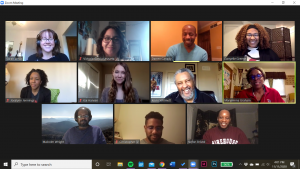
C: I can’t wait for the panel discussion. I’m excited to be in the presence of such great filmmakers and media studies academics. The graphic design is appealing, and I’m looking forward to seeing how all of our work culminates together. I hope for more of the general public to attend the discussion panel and to view the interactive map and timeline on HBW’s website. Since the program is virtual, more people can access the event without leaving the comfort of their homes. Our BLS has highlighted digital interaction in this year’s exhibit to ensure the optimal online experience.
Finally, do you have a favorite book/film from this year’s BLS? Can you tell us a bit about it and why it’s your favorite?
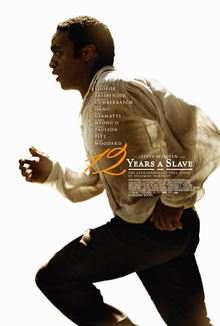
V: My favorite novel/film from this year is 12 Years a Slave, which is the autobiographical novel of Solomon Northup, a free man who was captured and thrown into slavery as an adult. It’s my favorite primarily because it’s a true story and I think that adds a layer of depth to it and I enjoyed learning about Northup’s life. It’s raw and real and does a great job of portraying the horrors of slavery. Steve McQueen’s film is equally as raw and profound, though it has its flaws. The casting of the film is great and featured some incredible performances such as Chiwetel Ejiofor in the role of Solomon Northup and Michael Fassbender as Epps.
A: My favorite novel/film to work on was The Sport of the Gods by Paul Laurence Dunbar. It was incredibly fascinating to learn about one of the most-widely recognized Black authors and his background as well as how it influenced his writing. Aside from that, the research needed to find information about the 1921 film adaptation was arduous and difficult; however, it was rewarding and I found out a lot about Reol Productions which produced films solely based on bringing the works of Black authors to the silver screen.
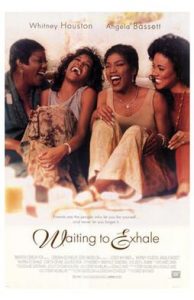
C: Their Eyes are Watching God of course by Zora Neale Hurston. The novel was published in 1937; the film adaptation, directed by Darnell Martin, was released in March 2005 –I watched the Hallie Berry movie a long time ago, but I do remember enjoying it. In Hurston’s narrative, the protagonist Janie Crawford, a middle-aged black woman returns to the town of Eatonville, Florida, one of the first self-governing black communities. The book starts off with her recounting to her friend Pheoby what has happened since she left. Janie recounts her three marriages, first to Logan, a pragmatic and unromantic man who treats her like a pack mule, who she leaves to be with Jody, the mayor of Eatonville. She and Jody are married for two decades when Janie finally exposes his ways, and shortly after he dies. Then Janie meets Tea Cake, the first man she truly falls in love with. They have a life together in the Everglades until the untimely end of their relationship following a terrible hurricane. Through these stories, Janie is able to find herself and finally be at peace with who she is. These themes of migration and movement are highlighted in our BLS exhibit as we explore the film adaptation of various Black writing.
This year’s Black Literary Suite has been a culmination of our entire HBW team coming together to create something special. With the unexpected obstacle of the Covid-19 pandemic, our team had to act quickly and efficiently to come up with ways to host BLS in a safe environment. Together with the help of everyone, we were able to pull of this year’s event, which we hope has been a success.